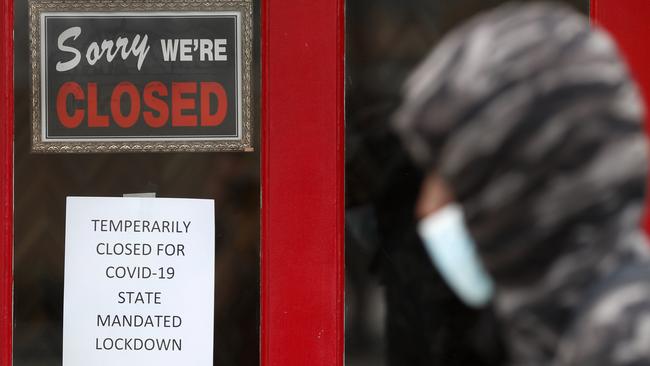Coronavirus: US unemployment hits 14.7 per cent, highest level since 1948
The April unemployment rate in the US rose to a record 14.7 per cent and payrolls dropped by an unprecedented 20.5m as the coronavirus pandemic hit the economy.

The April unemployment rate in the US rose to a record 14.7 per cent and payrolls dropped by an unprecedented 20.5 million as the coronavirus pandemic hit the economy.
April’s jobless rate eclipsed the previous record rate of 10.8 per cent for data tracing back to 1948.
The job losses due to business closures triggered by the coronavirus produced by far the steepest monthly decline on records back to 1939. By comparison, nearly 2 million jobs were lost in one month in 1945, at the end of World War II.
“The sharp increases in these measures reflect the effects of the coronavirus pandemic and efforts to contain it,” the US Labour Department said.
The job losses and high unemployment mark a sharp pivot from just a few months ago, when the economy was pumping out hundreds of thousands of new jobs, and joblessness was hovering near 50-year lows. The jobs bust has been widespread.
Employment fell sharply in all broad business sectors last month, with particularly heavy job losses in leisure and hospitality, which cut 7.65 million jobs. The healthcare, retail and professional services industries each lost more than 2 million jobs.
Last month, 88 per cent of Americans who newly lost their jobs in April reported being on temporary layoff. The unemployment rate rose more for women than men. Among racial groups, the rate increased the most for Hispanics, up 12.9 percentage points to 18.9 per cent. The rate rose about 10 percentage points each for white, black and Asian Americans.
Average hourly earnings increased by 7.9 per cent in April from a year earlier, likely reflecting that many low-wage workers lost their jobs, while more white-collar employees worked from home.
“It’s a very, very difficult situation, even for companies that were growing at a record pace before,” said Julia Pollak, labour economist at job site ZipRecruiter. “The big question is just, ‘How long-term will this be’?”
The longer-term severity of the employment crisis depends on factors such as the path of the coronavirus and how fast consumers start to visit businesses and open up their wallets, as the economy reopens. Such reopenings are already materialising in South Carolina, Georgia, Texas and elsewhere, though often with restrictions.
It will likely take a while for industries directly affected by the coronavirus, including restaurants, hotels and transportation, to recover.
Lower-income Americans are most vulnerable to the effects of job losses, said Steve Preston, chief executive at Goodwill Industries International.
“They have no resources. It takes time to get unemployment, if they qualify for unemployment,” Mr Preston said, referring to financial benefits that states offer to those out of work. He added most people coming to Goodwill for help are seeking support filing for unemployment benefits.
The widespread nature of the job losses extends to healthcare, as those not working to fight the pandemic are seeing fewer patients for routine checkups and, in some cases, only offering emergency procedures.
One indication of how quickly Americans can return to their jobs when the economy reopens is the number who are on temporary, as opposed to permanent, layoff.
“The more that workers have a connection to their previous employer, then the more rapidly we can start up jobs again,” said Erica Groshen, former commissioner of the Bureau of Labor Statistics under president Barack Obama. She noted that the increase in unemployment in March came from workers on temporary furloughs, not permanent layoffs.
Dow Jones



To join the conversation, please log in. Don't have an account? Register
Join the conversation, you are commenting as Logout